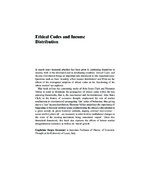Ethical Codes and Income Distribution
Proposal review
Author(s)
Forges Davanzati, Guglielmo
Language
EnglishAbstract
In contemporary non-mainstream economic debate, it is widely thought that the functioning of a market economy needs a set of rules (i.e. institutions) which bind agents in their behaviour, allowing efficient outcomes. This idea is contrary to the General Equilibrium Model (GEM) where markets are pictured as working in an institutional vacuum and where social and historical variables play no role. However, in more recent times, a large group of economists have begun to insert social and moral variables into standard models based on the rational choice paradigm, following the increasing interest – on the part of firms – in the possible positive effects of adopting ethical codes. In this key new text Guglielmo Davanzati studies this burgeoning view that ethics and economics can be compatible. Does ‘morality’ affect income distribution? And, if so, what are the effects of the widespread adoption of ethical codes on the functioning of the labour market? Central to Davanzati’s efforts is the thesis that the roots of these new developments can be traced back to the pioneering work of Thorstein Veblen and John Bates Clark. Utilizing their contrasting works, Davanzati’s text illuminates the propagation of ethical codes within the two opposing frameworks i.e. the neoclassical and the institutional. Davanzati’s important book will be an invaluable reference for readers interested in history of economic thought, economics and moral philosophy.
Keywords
john; bates; clark; thorstein; veblen; marginal; productivity; labour; market; bargainingDOI
10.4324/9780203016794ISBN
9780415365390;9780415494113;9781134215850;9781134215843;9781134215805OCN
1135855012Publisher
Taylor & FrancisPublisher website
https://taylorandfrancis.com/Publication date and place
2006Series
Routledge Studies in the History of Economics,Classification
Ethics and moral philosophy
Economics
Political economy
Business and Management


 Download
Download Web Shop
Web Shop